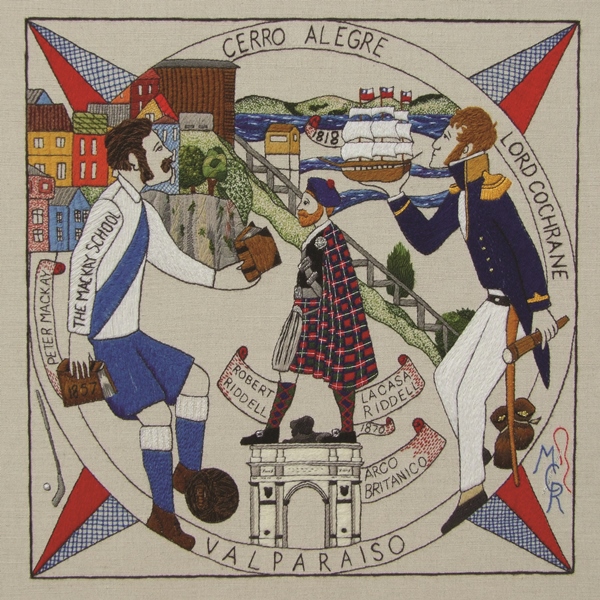
Stitcher: Mary Richardson (Tranent)
Valparaiso is the main seaport of Chile, with a major Scottish presence from the time of Lord Thomas Cochrane of Culross who arrived in 1818 to lead the Chilean Navy to victory in the War of Independence from the Spanish empire. As ‘El Cochrane’, most of the Chilean Navy crews were former Royal Navy sailors and many settled in Chile. In the mid-19th century Valparaiso grew as a major port on the Cape Horn route to the California gold rush.Thereafter Valparaiso expanded into a booming commercial centre servicing the Atacama Desert mines supplying the European industrial revolution with copper and mineral nitrates. Substantial banks and financial houses developed and the first Stock Exchange (Bolsa) in Latin America was founded in 1870, where fortunes were lost and won in mining shares and land speculation and funding the South American infrastructure.The European community lived on the cliff-top heights (cerros) overlooking Valparaiso port, linked to the city by the distinctive network of funiculars.
During the latter part of the 19th century the Chilean government appointed ‘colonization’ agents in Glasgow to encourage Scots emigrants, who were valued for their education. Some emigrants received land grants as the South of Chile was developed. The Valparaiso Scots community was noted for its engineers and successful entrepreneurs, a Royal Navy visitor Commander Crebbin wrote of ‘the great business houses with a decidedly Caledonian flavour’ in 1920. Peter Mackay (from Glasgow) founded the famous Mackay School in 1857, which introduced all the Scottish sports including football and rugby. The Scots community maintained close ties with the homeland, and many children returned to Scotland for their higher education.
In the 20th century both World Wars many Chilean Scots volunteered for the British forces, in some families all the young men were killed in action. In 1870 young Thomas Riddell (son of a prosperous Rutherglen publican) emigrated to Valparaiso, followed by his brother Robert Riddell and Robert’s wife Elizabeth Noble. Of course Robert Riddell brought his bagpipes to Chile. They founded a ships’ chandlery and mining supplies business; and Robert developed the fashionable Casa Riddell (Riddell House) department store, importing clothes and luxuries from Europe. The family also bought inland estancias.The Valparaiso boom was brought to an abrupt end by the 1906 earthquake (terremoto) which devastated the port and commercial centre and killed 4000 people. In 1914 the Panama Canal opened and Valparaiso was by-passed on the new shipping route from the Atlantic to Pacific oceans. Valparaiso entered a long period of decline, and the business community dispersed to the capital Santiago and elsewhere throughout the world. In recent years there has been a cultural renaissance of Valparaiso, in 2003 being designated as a UNESCO World Heritage Site. Robert’s son Robert ‘Bertie’ Riddell managed vast estancias in Patagonia including Tierra del Fuego, and surveyed early aviation charts of the Andes mountains. He also wrote extensively about Patagonian life and history. Robert Riddell’s descendants spread to many parts of the world, including some that returned to Scotland.
 CL01 Valparaiso
CL01 Valparaiso
Tha ceanglaichean air a bhith aig Valparaiso ri Alba on a bha Cochrane a’ stiùireadh na Cabhlaich Shileach bho 1818. Bha Albannaich cliùiteach mar innleadairean agus luchd-tionnsgain. Shoirbhich le Valparaiso mar ionad malairteach air an t-slighe gu boile an òir ann an California, ged a thug crith-thalmhainn uabhasach ann an 1906 agus Canàl Panama bho 1914 crìonadh sa chùis. Chuir Pàdraig MacAoidh à Glaschu Sgoil ainmeil MhicAoidh air bhonn ann an 1857. Ann an 1870, ràinig Tòmas Riddell agus an uair sin a bhràthair Raibeart à Rutherglen, a’ stèidheachadh loicheadaireachd shoithichean agus gnothachas solar mhèinnearachd. Leasaich Raibeart an stòr reic fhasanta, Casa Riddell, agus cheannaich e estancias. Bha mac Raibeirt, ‘Bertie’, a’ ruith estancias ana-mhòr agus sgrìobh e mòran mu dheidhinn Patagòinia.
